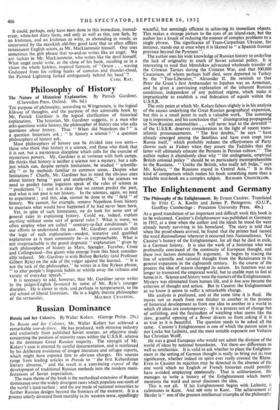Russian Dominance
Russia and her Colonies. By Walter Kolarz. (George Philip. 25s.) IN Russia and her Colonies, Mr. Walter Kolarz has achieved a remarkable tour-de-force. He has produced, with immense industry and exclusively from published Soviet sources, an objective study concerning the position of minority races within the U.S.S.R. relative to the dominant Great Russian majority. The strength of Mr. Kolarz's case is attested by careful documentation, and is reinforced by his deliberate avoidance of émigré literature and refugee reports, which might have exposed him to obvious charges. His sources range from leading articles in Pravda to " the first Kabardinian literary almanac," and the result is a convincing expose of the development of traditional Russian methods into the modern mani- festations of Soviet imperialism. • The main theme of the book is the methodical extension of Russian dominance over the widely divergent races which populate one-sixth of the world's land-surface and the use made of national minorities to further Russian designs beyond the frontiers of the moment. It is a process utterly divorced from morality in its western sense, appallingly wasteful, but seemingly efficient in achieving its immediate objects. This makes a strange picture to the eyes of an island-race, but the author has a knack of reducing the essence of complex problems to a single phrase. The significance of Trans-Carpathian Ukraine, for instance, stands out at once when it is likened to " a Spanish frontier province beyond the Pyrenees ".
The author uses his wide knowledge of Russian history to underline the lack of originality in much of Soviet colonial policy. It is interesting to read that Menshikov advocated wholesale transfer of the Crimean Tartars during the Crimean War, and that 500,000 Caucasians, of whom perhaps half died, were deported to Turkey by the " Tsar-Liberator," Alexander II. He reminds us that Peter the Great's first Ambassador to Ispahan was an Armenian, and he gives a convincing explanation of the inherent Russian conditions, independent of any political regime, which make it impracticable to establish a real federation of equals within the The only point at which Mr. Kolarz falters slightly is in his analysis of the causes underlying the Great Russian geographical expansion, but this is a small point in such a valuable work. The summing up is impressive, and his conclusion that " disintegrating propaganda to Non-Russian nationalities . . . will never lead to the downfall " of the U.S.S.R. deserves consideration in the light of recent trans- atlantic pronouncements. " The first doubts," he says " have already emerged among the Satellites and have even crept into Russia itself," which probably reduces the effectiveness of Party clowns such as Fadeev when they assure the Tadzhiks that the latter will ultimately educate the Persians in Persian culture." The author makes it abundantly clear why " the undogmatic, empirical British colonial policy " should be so particularly incomprehensible to the Russians. " Unlike the British, who really left India," says Mr. Kolarz, " the Russians stayed in Central Asia." It is this kind of comparison which makes his book something more than a readable text-book on a complex subject. RICHARD CHANCELLOR.


































 Previous page
Previous page